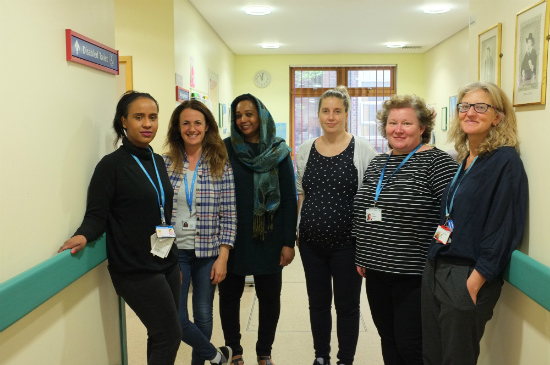Sunflower clinics
Contact
- General Enquiries
- 077 3097 0738
Juliet Albert, specialist FGM midwife
- General Enquiries
- 020 3312 1060
Zuriash Amare, specialist FGM midwife
Visitor Information
Translation help:
To translate this page into your preferred language, click the Google Translate icon in the top-right menu and select your desired language.
Female genital mutilation (FGM), also known as female circumcision, is a procedure in which the female genitals are deliberately cut, injured or changed when there's no medical reason for doing so.
It is generally performed on girls under the age of 15. It is very painful and can seriously affect the long-term health of women and girls. It can cause particular harm during pregnancy and labour. FGM is illegal in the UK.
The Sunflower clinics are three specialist clinics for women and families in north west London who are affected by FGM.
All of the Sunflower clinics are staffed by female-only midwives. We have health advocates who speak Somali and Arabic and access to specialist counselling support. The midwives who run the clinics are specialists who have years of experience in helping and caring for women with FGM.
Two of the clinics are for pregnant women with FGM who are booked to have their baby at Queen Charlotte’s & Chelsea or St Mary’s hospitals.
We also run a gynaecology clinic at Queen Charlotte’s & Chelsea Hospital for women with FGM who are not pregnant. Women are encouraged to self-refer to this fast-track, midwifery-led service.
Conditions we treat
We treat all women and families who have been affected by FGM.
We can diagnose the type of FGM and we offer deinfibulation (‘reversal/opening’ procedure) using local anaesthetic.
We also refer women to the hospital if they require or would prefer the opening procedure under general anaesthetic. We also can refer women with chronic perineal pain to specialist urogynaecology services.
Clinics
At the Trust we have three specialist clinics for women and families affected by FGM.
All our clinics are staffed by female-only midwives.
We have specialist health advocates who speak Somali and Arabic and access to counselling support. The midwives who run the clinics are specialists who have years of experience in helping and caring for women with FGM.
Clinic 1 – A clinic for women who are not pregnant
Address
Queen Charlotte's & Chelsea Hospital Sunflower clinic
Gynaecology outpatients
Ground floor
Queen Charlotte's & Chelsea Hospital
Du Cane Road
London W12 0HS
Hours
09.00 to 12.00 on alternating Fridays.
Contact information
Phone: Juliet Albert 077 3097 0738
Email: juliet.albert@nhs.net
Clinic 2 – For pregnant women booked to have their baby at Queen Charlotte’s & Chelsea Hospital
Address
Queen Charlotte's & Chelsea Sunflower clinic
Ground Floor
Queen Charlotte’s & Chelsea Hospital
Du Cane Road
London W12 0HS
Hours
09.00 to 12.00 on alternating Fridays.
Contact information
Phone: Juliet Albert 077 3097 0738
Clinic 3 – For pregnant women booked to have their baby at St Mary’s Hospital
Address
St Mary's Hospital Sunflower clinic
Maternity day assessment unit
St Mary’s Hospital
Praed Street
London W2 1NY
Hours
Every Tuesday.
Contact information
Phone: Zuriash Amare 020 3312 1060 or 020 3312 1730
Meet the team
Specialist FGM midwives
Juliet Albert
Zuriash Amare

Patient information
Before your appointment
If you are not pregnant you can self-refer or ask your GP to refer you to our clinic for women who are not pregnant.
If you are pregnant and have been booked to have your baby at either Queen Charlotte’s & Chelsea or St Mary’s hospitals, you will be referred to one of the clinics at these hospitals and will be given an appointment.
Once we receive your referral, we will contact you with the date and time of your appointment.
At all three clinics, you are welcome to bring a friend, family member or carer to the appointment. Before you arrive, your health advocate will let you know whether you need to bring anything.
During your appointment
Appointments range in length from 20 minutes to one hour.
The midwife will welcome you to the clinic and introduce herself. She will then discuss with you the different types of FGM, where it is practised, why it is carried out and the law in the UK.
The midwife will then carry out a visual inspection of the genital area to diagnose what type of FGM you have. She will do this sensitively and gently with a counsellor or health advocate providing support. The midwife will then explain the deinfibulation procedure to you and may perform it during your appointment. If you are pregnant, the midwife will also help you to plan your care for labour.
Please note that our hospitals are teaching hospitals, so medical students may be present for some appointments, but only if you give consent. If you do not, they will be asked to step outside.
After the appointment
Some women will require a follow-up appointment two weeks later. You will also have access to a counsellor, who will be able to provide specialist support.
Further resources and contacts
NHS Choices website has more information on FGM at NHS Choices: FGM
There are a number of organisations which offer specialist support for women and families who have been affected by FGM.
- NSPCC FGM helpline: 0800 028 3550
- FORWARD UK: a national and local charity for people affected by FGM. Call 020 8960 4000, extension 1 or email support@forwarduk.org.uk.
- Midaye Somali development network: a local charity for people affected by FGM. Call 020 8969 7456
Refer to this service
GP
Please use NHS e-Referrals to refer a patient to our service.
Secondary care
For secondary care, please call Juliet Albert: 077 3097 0738.
Self-referral
Women who have FGM and are not pregnant can self-refer to our specialist clinic. Please download and complete our self-referral form and email it to imperial.fgmservice.gynaeicht@nhs.net
Education and elective placements
We offer elective training placements within the Sunflower clinics. For more information please call one of our specialist FGM midwives or our health advocate.
